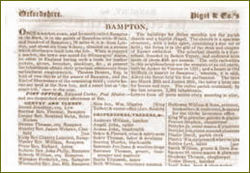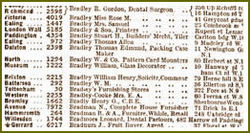Difference between revisions of "Directories: Trade, Street and City"
From the Family Tree Forum Reference Library
Darksecretz (talk | contribs) |
|||
| (13 intermediate revisions by 4 users not shown) | |||
| Line 1: | Line 1: | ||
| + | [[Category:General Reference]] | ||
| + | __NOEDITSECTION__ | ||
| + | |||
__TOC__ | __TOC__ | ||
==What Will I find ?== | ==What Will I find ?== | ||
[[image:pigots.jpg|right|250px|thumb|Pigots Directory 1830]] | [[image:pigots.jpg|right|250px|thumb|Pigots Directory 1830]] | ||
| − | County, Regional, Town, City or Trade Directories | + | County, Regional, Town, City or Trade Directories provide us with valuable detail for 19th and 20th Century research. |
| + | |||
*Directories list people/occupations and addresses. | *Directories list people/occupations and addresses. | ||
| Line 12: | Line 16: | ||
*In earlier directories, only notable members of the community may be listed. | *In earlier directories, only notable members of the community may be listed. | ||
| + | |||
*Different directories list information in different ways: | *Different directories list information in different ways: | ||
| − | ** | + | **By street, with the street names in alphabetical order |
| − | ** | + | **By occupation |
| − | ** | + | **By people's names, again alphabetically, followed by their addresses |
| − | + | **Women would be included if they were private householders or business people | |
| + | |||
<br><br> | <br><br> | ||
[[image:telephone.jpg|left|250px|thumb|Extract from 1921 Telephone Directory]] | [[image:telephone.jpg|left|250px|thumb|Extract from 1921 Telephone Directory]] | ||
| − | The availability of directories varies from area to area, and the time span that they cover also varies. | + | The availability of directories varies from area to area, and the time span that they cover also varies. Directories exist from as early as the mid 1700s and some continued to be published until fairly recent times (1970s).<br> |
Directories can help us with 20th century research in the absence of census records or known addresses - working in conjunction with electoral registers for tracking family movements. | Directories can help us with 20th century research in the absence of census records or known addresses - working in conjunction with electoral registers for tracking family movements. | ||
*[http://www.historicaldirectories.org Historical Directories] is a good place to get an idea of what these directories are like and how to search them | *[http://www.historicaldirectories.org Historical Directories] is a good place to get an idea of what these directories are like and how to search them | ||
| + | <br><br> | ||
| + | |||
| − | Back to [[ | + | Back to [[Records Office Guide]] |
Latest revision as of 17:22, 25 September 2022
Contents
What Will I find ?
County, Regional, Town, City or Trade Directories provide us with valuable detail for 19th and 20th Century research.
- Directories list people/occupations and addresses.
- They can be searched usually by location, decade and/or key word.
- Not all directories are searchable by all methods.
- In earlier directories, only notable members of the community may be listed.
- Different directories list information in different ways:
- By street, with the street names in alphabetical order
- By occupation
- By people's names, again alphabetically, followed by their addresses
- Women would be included if they were private householders or business people
The availability of directories varies from area to area, and the time span that they cover also varies. Directories exist from as early as the mid 1700s and some continued to be published until fairly recent times (1970s).
Directories can help us with 20th century research in the absence of census records or known addresses - working in conjunction with electoral registers for tracking family movements.
- Historical Directories is a good place to get an idea of what these directories are like and how to search them
Back to Records Office Guide

